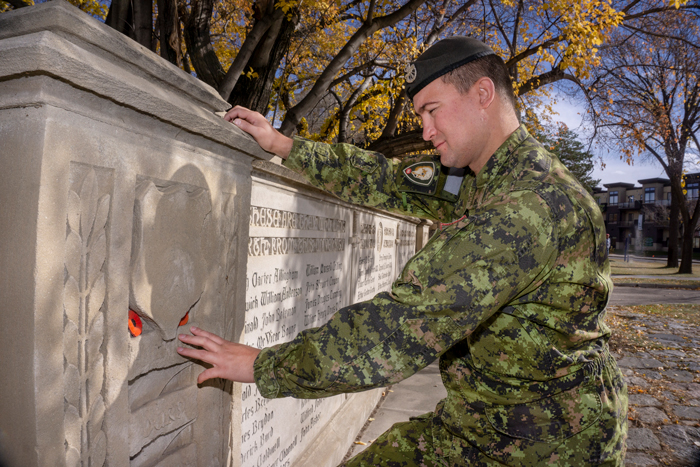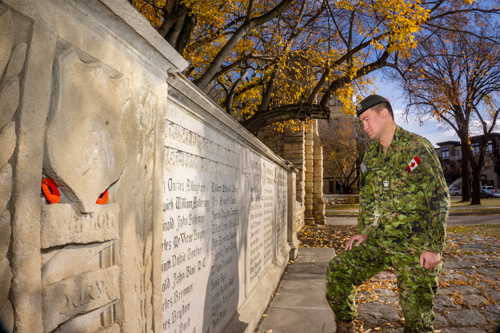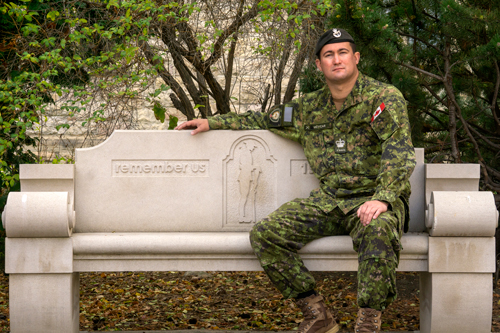
Always ready, always prepared
COVID-19 won’t get in the way of celebrating Remembrance Day for USask grad
By John GraingerA worldwide pandemic won’t stop or slow Remembrance Day from being celebrated again this year, says USask grad and Saskatoon-based soldier Warrant Officer Ross McVicar (BA’06).
McVicar, a member of the North Saskatchewan Regiment in Saskatoon, says the COVID-19 disruption won’t get in the way of the military from carrying on the annual tradition. He insists that there is still a way to celebrate Remembrance Day in a safe way, while still maintaining COVID-19 guidelines.
“Within the military context, it’s not hard to keep Remembrance Day going regardless if we get to do a parade this year or not. Every individual is going to be going through his own motions on the 11th hour of the 11th day in their moments of silence. We will definitely be doing something internally,” he said.
“We’re trained to operate if we’re in a chemical or biological or a nuclear war setting. This is just another challenge for us to rise up and meet.” says the 36-year-old McVicar, who was raised in the Colonsay area east of Saskatoon and attended school in Clavet, Sask., before heading to USask for his post-secondary education.
“The military is definitely taking measures to prevent the spread of COVID-19 within our members. Provincial health measures are implemented across all armouries and training areas in Canada. Members are physically distancing, wearing masks and frequently sanitizing all common areas.”
Military training courses with out-of town-participants are also implementing “course bubbles” where soldiers are quarantined and monitored for COVID-19 symptoms before members are free to interact with each other, adds McVicar.
McVicar, who served a seven-month tour in 2008 in the hot and dusty world of Kandahar province in Afghanistan, said there are still many Canadians serving in high-risk areas around the world.
“Canada is doing fairly well considering how we were able to flatten the (COVID-19) curve this summer, but there are other places in the world, where some of our soldiers are deployed, those locations are not as safe as home. But they are still deployed and operating in those countries doing their jobs,” he said.
This is where Canada’s strength in training comes into play, McVicar said, who today spends much of his time training other soldiers in bases, not just in Saskatchewan, but around Canada. As a warrant officer, McVicar is second in command of a platoon. McVicar now works with 38 Brigade group which operates from Thunder Bay, Ont. to Saskatchewan.

“They are taking the proper precautions to keep our people and our communities safe,” he said.
That training in service is what initially drew McVicar into a military life. He joined as a high school student and then combined his university classes with his military life on weekends.
“I think I joined for the job and the money. It’s a good part-time job with employment in the summer, too,” said McVicar.
Of course, there was the financial support from the military for McVicar when his university career began that was nice to receive. But the seed of service to his country had already been sown, he said.
“You end up sticking around because you get immersed in the culture and with the high-calibre of people you work with. In my experience, most people really enjoy their service,” said McVicar.
McVicar’s idea for a career in the military service really galvanized during his time at USask.
“Once I was in university, definitely, I thought this is what I wanted to do,” said McVicar, who originally enrolled in engineering, but switched to a history degree after the first year.
“The more things I did and the more interesting places I went, the more I knew this is kind of where I wanted to go. And after doing it for a bit and trying out some civilian jobs, it was like, ‘yeah, that’s not what I was looking for.’ ”
McVicar said he was able to link his USask studies to where he wanted to go in his military degree.
“I streamlined myself more into that military aspect of history. I could get a better understanding of the history and the culture of where we would be deploying.”
As a student, McVicar kept himself very busy with his studies during the week coupled with military training on weekends. It helped him having others on campus who were having a shared experience of also handling schooling with military exercises on weekends.
“The reserve force in town has a lot of members that are currently active in university,” he said.
McVicar said the importance and continuing respect for those who have served Canada, and perhaps even given their life for Canada, is something he never takes for granted.
He said Canada’s military history is deeply embedded in how they are trained.
McVicar maintains it’s not hard for those in the military to remember, especially on Remembrance Day, because they’re remembering their friends, brothers and sisters. In their regiments and traditions, there’s symbols of those who have served all around them.
He believes Canadians still hold Remembrance Day as a special day. For instance, there are numerous places in Saskatoon where citizens can appreciate the military’s role in our shared history.
Unfortunately, Saskatoon’s annual event at SaskTel Centre will not be held due to COVID-19 restrictions. It’s one of the largest indoor Remembrance Day events in Canada which frequently draws in excess of 10,000 people.
A virtual event will be available on Facebook. He adds the public is asked to not visit any armouries on Remembrance Day in compliance of provincial health regulations.
But there are still many places to independently visit in Saskatoon on Remembrance Day to honour the military, such as the Memorial Gates on College Drive, the Vimy Ridge memorial downtown, the war cemetery at Woodlawn cemetery or even at city hall’s civic square where plaques have been installed to recognize those who have gone to serve in conflicts around the world, including Afghanistan, where McVicar was deployed.

Unveiled just two years ago on the USask campus is the Great War memorial bench, in the Memorial Union building courtyard adjacent to Louis Pub.
“We do a lot especially within my unit to inform our members, show them where those symbols are. We’ll take them down there for guided tours and show them the history and significance of certain places that we have within the city,” said McVicar.
Those are places for the average Saskatoon resident to visit any time of year and to continue to learn about Canada’s efforts. That’s something not lost on McVicar and others in the military, he maintains.
“They’re there, especially for people in university, doing their research, doing their projects. You can easily find that information and do your homework, so to speak, to learn more about the place you live.”
That’s why McVicar is confident Remembrance Day will always play a major role in our lives, even with a global pandemic.


